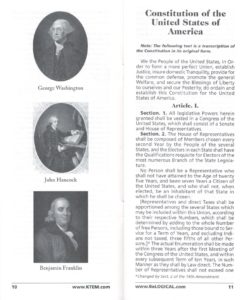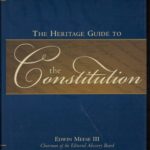The Framers created Safeguards that we mostly ignore
To paraphrase the great Humphrey Bogart movie “Treasure of the Sierra Madre,” Constitution? I don’t have to show you any stinkin’ Constitution. The original quote was about a bandit trying to pass off his gang as Federales.
But how like how our presidents. And our members of Congress.
The Constitution has become an afterthought – something a bunch of men put together to get us started, but to hell with it now. Certainly, in recent times, presidents Barack Obama, George W. Bush, Joe Biden, and Donald Trump never let it get in the way of Acts of War, or making great societal changes.
But the Framers of Constitution had other ideas.
They set up the country in a way to make sure we thought about stuff – like war – and that those decisions were very carefully considered.
AUDIO: Random Samplings of a Logical Mind
Three co-equal branches of government – and yet they all assume powers they don’t have.
It gets sticky. With regard to declaring war, the Constitution is crystal clear:
The Congress shall have the power to…declare war…
Article I, Section 8, Clause 11
So then, is an Act of War the same thing as declaring war? It was “bombs away” during the Obama years as he is said to have dropped re than 26,000 bombs in just 2016 alone. The fact-checking site Snopes confirms that total. President George W. Bush gave us “Shock and Awe” in Iraq that didn’t turn out so well, irrespective of his “Mission Accomplished” banner.
Joe Biden didn’t drop bombs Obama-style, but his fervor to get us out of Afghanistan with no plan is just as bad. Trump ran on a platform of not getting America involved in forever wars, and yet struck Iran nuclear sites without Congressional approval.
Video: One of the great movie scenes of all time – No Stinking Badges (1948)
Even when these presidential forays into foreign countries work out well, the question still remains as to their constitutionality. Note that there is no doubt that the POTUS has the authority to conduct wars. The issue is: who can initiate them? The Framers believed that one man ought not to have that power. There is some question about the difference in “declaring war” and “engaging in war” – see Article I, Section 10, Clause 3 – but I’m not convinced.
I think a president has the power to react swiftly when the United States is under attack, but for a long-term war to ensue, Congress must declare it so. This was a safeguard to keep presidents from getting us involved in wars that we ought not be in or might avoid through diplomacy.
RELATED: We could have a functioning immigration system if we had a functioning Congress
Congress, for its part, doesn’t want the constitutional responsibility of declaring war. It doesn’t look good at election time to have voted for such a thing. Best to pass bunch of laws that delegate the power to the president, and blame him if it goes wrong. And that’s our current system. The problem is that the Framers wanted a safeguard, and now we don’t have it.
What of the Alien Enemies Act of 1978?
It has generally been accepted since the time of the Framers that the President of the United States has the power to repel invasions. This is a commonsense interpretation, and yet, it leads to a separate issue: how to determine when the United States is being invaded. When Joe Biden and his handlers, now commonly referred to as “the Autopen,” simply obliterated the Southern border, they did it without consent of Congress, that is to say, no bill was passed allowing this to happen. Millions of “migrants” flowed across including criminal illegal aliens who proceeded to commit crimes including murder. President Trump considered this an invasion.
The Alien Enemies Act authorizes the president to detain and deport citizens of enemy nations, but only following either a declaration of war or an attack upon the United States. This is interesting since Congress never declares war, so, a Chief Executive like Donald Trump must rely on the second reason, which, in our current situation, amounts to drugs like fentanyl coming in along with human trafficking and murders such as that of the young college student Laken Riley.
The Supreme Court is not above taking powers it does not have.
The Framers called for a Supreme Court and left the rest of the judiciary up to Congress.
The judicial Power of the United States shall be vested in one Supreme Court, and in such inferior Courts as the Congress may from time to time ordain and establish.
Article III, Section I
It’s sad to have to remind people in our country of the very basics of our three branches. But just to refresh you, Congress (the legislative branch) makes the laws. The president (the executive branch) is charged with administering those laws. The Supreme Court (the judicial branch) is charged with expounding laws to decide particular cases. The Heritage Guide says this:
Since 1787, the central meaning of “judicial power” has remained remarkably consistent: neutrally deciding a case by interpreting the law and applying it to the facts, then rendering a final and binding judgment.
To be clear, the Supreme Court does not make laws. Except when it does – the most egregious
violation of this constitutional edict being Roe v. Wade in which the High Court clearly made law. It does it all the time. Another example is the way Chief Justice John Roberts twisted the law to make the Affordable Care Act (Obamacare) seem legal.
Any time to you see a Supreme Court ruling that is decided 5 to 4 or 6 to 3, some or all of those justices are ruling on ideology and not the Constitution or law. In the current Supreme Court, when the three left-wing justices – Ketanji Brown Jackson, Elena Kagan, and Sonia Sotomayor – all vote as a bloc, it’s often in support of a liberal cause.
However, it does not matter which side is activist. This should never be happening in the branch of government that is supposed not to be political. Rulings ought to be based on three considerations – and three only, and in this order: (1) The Constitution (2) the law, and (3) precedent. And number three is far down in relevance from the first two, or we would still have segregated schools.
RELATED: Our Poor Pitiful Underpaid Congress
What this means is that nearly all Supreme Court decisions should be 9 to 0. But we have rampant judicial activism and that damages one of our safeguards.
The wisdom of the Framers.
Think about it. The Framers looked at other countries and what they were doing right and wrong. They wanted no dictators or strongmen. They mixed everything up. The way the government was set up was varied and required a lot of agreement or buy-in from other branches. Consider this:
- The president would be elected by the Electoral College to make sure all states – even small ones – had a say.
- The House of Representatives was the people’s house and would be voted into office by direct vote of the people.
- The Senate would be composed of members selected by the individual states, and would represent those states. This was blown by the 17th Amendment, and eliminated one of the Framers’ safeguards.
- Only the Congress could declare war but only the president could make decisions on how that war would be waged.
- The president could make treaties with other countries, but those treaties must be approved by the Senate. (Note that Obama got around this in his treaty with Iran by calling it something else.)
- Bills involving spending must originate in the House of Representatives but be approved by the Senate.
- If a president does not like a bill that lands on his desk, he can veto it.
- The vice president can break a tie in the Congress.
- The president appoints justices of the Supreme Court, but must have Senate approval.
- Supreme Court justices are appointed for life and are not elected or subject to being fired, but may be impeached.
- The president may be impeached and tried in the Senate. The 25th Amendment may remove him for cause.
- The president of the United States is limited to two terms by the 22nd
- Some powers belong to the federal government and others are reserved for the states.
You can read through the Constitution and find these safeguards and others. Some of them, we still adhere to. The key one that we threw out in favor of direct election of senators, amounts to a major power-grab by Washington. One safeguard we need and do not have is some sort of reasonable term limits for member of Congress. Another might be an amendment to prevent Congress from delegating its war powers to the POTUS.
RELATED: Governing From the Center Is a Dead Concept
It’s clear that the Framers did not envision a country in which a president could become all-powerful, or a congress could shirk its duties, or a high court could move out of its lane by actually making laws. Sadly, politics in the 21st Century often seems to be about the three branches of our government trying to figure out how they can get around the safeguards the Framers gave us.
[We] don’t have to show you any stinkin’ Constitution.
 Lynn Woolley is a Texas-based author, broadcaster, and songwriter. Follow his podcast at https://www.PlanetLogic.us. Check out his author’s page at https://www.Amazon.com/author/lynnwoolley.
Lynn Woolley is a Texas-based author, broadcaster, and songwriter. Follow his podcast at https://www.PlanetLogic.us. Check out his author’s page at https://www.Amazon.com/author/lynnwoolley.
Order books direct from Lynn at https://PlanetLogicPress.Square.Site.
Email Lynn at lwoolley9189@gmail.com.
This book is about an alternate Earth in which some of these safeguards have been eliminated. And what happens to it.



